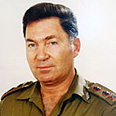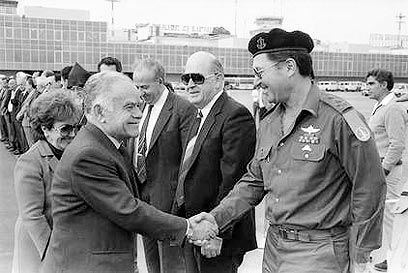
13th IDF Chief of Staff Dan Shomron dies
Shomron, 70, passed away Tuesday at Tel-Aviv’s Sourasky Medical Center where he was hospitalized three weeks ago following a stroke. Peres: He was one of the IDF’s greatest generals
President Shimon Peres said in eulogizing Shomron that “he was one of the greatest generals that the IDF had ever known, and a born warrior. I remember him most for his actions during the raid on Entebbe. Everyone said this operation was a fantasy that could not be actualized, but Shomron insisted that the IDF’s reach was long indeed, and that that it could be done.
"He was extremely opinionated, strong willed. He was a man of vision and a true leader that will go down in the annals of Israeli history as well as those of the IDF.”
Prime Minister Ehud Olmert also referred to Shomron's death, saying that "he was a brave fighter and left his mark on the IDF's fighting spirit and the daring missions in its history."
In a statement, Olmert wrote that Shomron's death "is a loss for all of Israeli society. For many years, he commanded the IDF's elite special forces units and in all positions he enjoyed appreciation, personal affection and respect.
Dan, born in Kibbutz Ashdot Yaakov, had all the values of loving the land, an obligation to society, modesty in his public and private life that were a symbol to be emulated for many in the State of Israel," Olmert wrote.
Defense Minister Ehud Barak said that "Dan was one of the most outstanding field commanders and one of the bravest in the IDF in the last few decades…he was a man who left his inerasable mark on the security of Israel and the IDF's operational capabilities."
Dan Shmoron was born in Kibbutz Ashdot Yaakov in 1937. He enlisted in the IDF in 1956, where he served as part of a paratrooper brigade during the Sinai Campaign and the Suez Crisis. He commanded a reconnaissance division during the Six Day War, and won the Medal of Distinguished Service for his actions during this campaign. Following the Six Day war, Shmoron commanded a paratrooper brigade, but later transferred to the IDF’s Armored Corps.
During the 1973 Yom Kippur War, Shomron led an IDF Armored Corps division participating in the siege on the Egyptian Third Armored Division. In 1974, as an IDF Infantry Division and Paratrooper Brigade officer, Shomron led the IDF’s historic raid on Entebbe known as “Operation Jonathan”. He served at the IDF’s Southern Command chief between 1978-1981, and was in charge of the dismantling of Israeli settlements and army bases in the Sinai Peninsula within the framework of the Camp David Accords of 1978 with Egypt.

Genral Dan Shmoron with former Prime Minster Yitzhak Shamir (Photo: GPO)
In 1983, Shomron established the IDF Ground Forces Command (in charge of the infantry, tanks, artillery and engineer corps) and was its first commander. He served as deputy IDF chief of staff from 1985-1986, and was appointed chief of staff a year later.
During Shomron’s reign as IDF chief of staff, the Lavi project was cancelled, and the First Gulf War broke out. The definitive moment in Shomron’s reign, however, was the outbreak of the first Intifada.
Shmoron retired from military life in 1991. He went on to serve as chairman of the Israeli Military Industries, as well as to found the short-lived “Third Way” political movement. He also served as part of the Israeli-Palestinian negotiating team during Benjamin Netanyahu’s reign as prime minister, and helped formulate the Hebron accords.
A year ago, Shomron was appointed by the Knesset to examine the performance of the IDF General Staff during the Second Lebanon War. He noted that the war was ”conducted aimlessly” and that the current IDF General Staff must do much to enhance the army’s overall performance and management.










